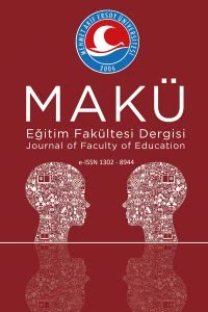Okul öncesi eğitim alanında çalışan erkek öğretmenlerin mesleki motivasyonlarını etkileyen unsurlar hakkında bir araştırma
Bu çalışmanın amacı erkekleri okul öncesi eğitim alanında öğretmen olmaya ve bu meslekte tutmayayardımcı olan etkenleri araştırmak bu öğretmenlerin tecrübelerini paylaşarak okul öncesi eğitimde erkekkatılımını teşvik etmektir. Ayrıca, okul öncesi eğitim yöneticilerini erkek varlığının okul öncesi kurumlardaçeşitliliği ve eşitliği arttırdığına yönelik olarak bilgilendirmektir. Konu ile derinlemesine bilgi sahibi olmak içinbetimleyici vaka çalışması gerçekleştirilmiştir. Çalışma için amaca dayalı örnekleme yöntemi kullanılarak yediöğretmen seçilmiştir. Veriler yarı-yapılandırılmış görüşme tekniği ile toplanmıştır. Sonuçlara gore öncedençocuklarlaolan tecrübe, ebeveyn olmak, çocuklara yardımcı olma isteği, iş arkadaşıyla olan ilişki, işyeri ortamıerkeklerin bu mesleğe girmesi ve kalması için etken olan kategoriler olarak ortaya çıkmıştır.
An exploratory study on the factors which influence professional motivation in male early childhood teachers
This exploratory study aims to investigatethe factors which motivate men to enter and remain asteachers in early education field, and to encourage male involvement in early education by sharing the collectivewisdom of experienced male teachers. The researchers also aim to inform childcare center directors andrecruiters about the advantages of having males as teachers in order to bring real diversity and equality into theearly childhood education. A descriptive case study method was employed in the study to gain in-depthunderstanding of the issue. Using purposive sampling seven male teachers were selected to participate in thestudy. The data was collected through semi-structured interviews. The results revealed that prior experiencewith children, being parent, wanted to help children, relationship with the co-worker, and the workplaceenvironment are the main categories that affected males to enter and stay in the profession.
___
- Barnard, C., Hovingh, L., & Nezwek, M. (2000). Recommendations for improving the recruitment of male early childhood education professionals: the female viewpoint. (ERIC Document Reproduction Service No. ED440759)
- Budig, M. J. (2002). Male advantage and the gender composition of jobs: who rides the glass escalator? Social Problems, 49(2), 258-277.
- Carspecken, P. F. (1996) Critical Ethnography in Educational Research; a theoretical and practical guide. New York and London: Routledge.
- Cook, A. F. (1997). Perceptions and beliefs regarding men in elementary and early childhood education. Eastern Education Journal 26, 29-33.
- Cooney, M. H. & Bittner, M. T. (2001). Men in early childhood education: Their emergent issues. Early Childhood Education Journal, 29, 77–82.
- Crano, W. D., & Brewer, M. B. (2002). Principles and methods of social research (2nd ed.). Mahwah, NJ: Lawrence Erlbaum Associates.
- Creswell, J. W. (2003). Research design: qualitative, quantitative, and mixed methods approaches (2nd . Ed.). Thousand Oaks, CA: Sage Publications Cunningham, B. (1998). Recruiting male volunteers to build staff diversity. Child Care Information Exchange September: 20–22.
- Cunningham, B. (1999). Hiring and retaining male staff. Child Care Information Exchange January: 20–22.
- Cunningham, B., Watson, L.W. (2002). Recruiting male teachers. Young Children, 57(6), 10- 15
- Farquhar, S. (1997). Are male teachers really necessary? Auckland: New Zealand Association for Research Education.
- Jensen, J. J. (1996). Men as workers in childcare services. London: European Commission Network on Childcare
- King, J. R. (1998). Uncommon caring: learning from men who teach young children. New York; Teachers College Press.
- Lincoln, Y. & Guba, E. (1985). Naturalistic inquiry. New York: Sage Publications.
- McBride, B. A. and Rane, T. R. (1997). Father/Male involvement in early childhood programs: issues and challenges. Early Childhood Education Journal, 25(1), 11-15.
- Merriam, S. B. (2001), Qualitative research and case study applications in education, San Francisco, CA: Jossey-Bass,.
- Mullohand, J. (2001). Meeting the demand for male primary teachers? Paper presented at the Australian Teacher Education Association Conference .
- Murray, S. B. (1996) „We all love Charles‟ – Men in childcare and the social construction of gender. Gender and Society, 10(4), 368-385.
- Neugebauer R. 1994. Recruiting and retaining men in your center. Child Care Information Exchange, May: 8-11.
- Robinson B. E. (1981) Changing views on male early childhood teachers. Young Children, 36(5), 27-31.
- Robinson, B. E. (1988). Men in child care: A vanishing breed. Education Digest, 46-48.
- Rodriguez, E. (1997). What does gender have to do with it? (Male teachers in early childhood education). (ERIC. Document Reproduction Service No 415 979).
- Sanders, J. (2002). Something is missing from teacher education: attention to two genders. Phi Delta Kappan, 84, 241-244.
- Sarantakos, S. (2005). Social research. Hampshire, Palgrave Macmillan.
- Sargent, P. (2001). Real men or real teachers: contradictions in the lives of men elementary school teachers. Harriman: Men's Studies Press.
- Sargent, P. (2002). Under the glass: conversations with men in early childhood education. Young Children, 57(6), 22-30.
- ISSN: 1302-8944
- Yayın Aralığı: Yılda 4 Sayı
- Başlangıç: 2007
- Yayıncı: BURDUR MEHMET AKİF ERSOY ÜNİVERSİTESİ
